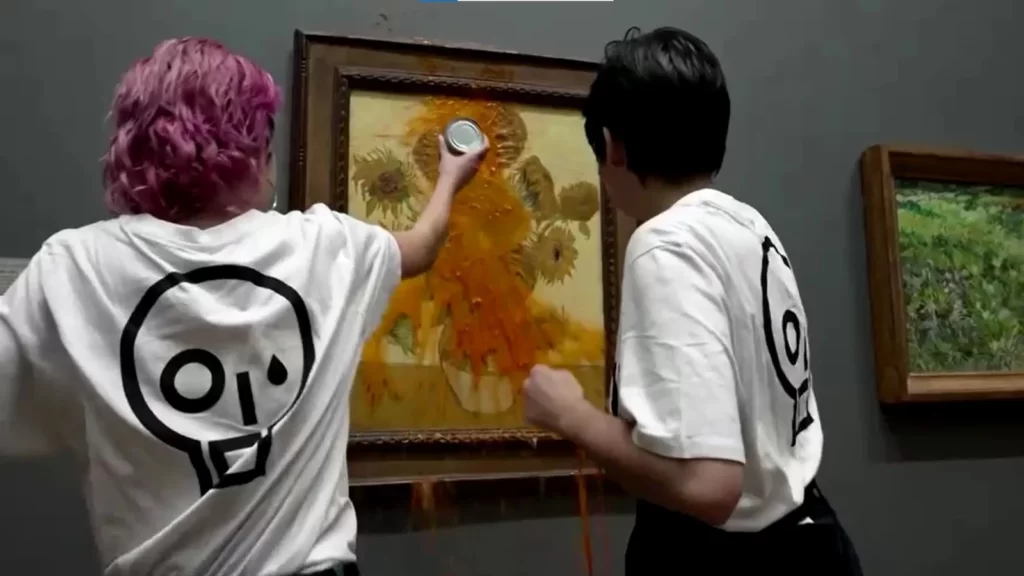The climate activists in Paris splashed soup on the iconic ‘Mona Lisa’ painting at the Louvre Museum. This dramatic act of protest occurred amidst a larger demonstration by farmers driving tractors through the streets of Paris, drawing attention to the urgent need for action on climate change and agricultural reform. While the incident may seem baffling at first glance, delving deeper reveals a complex interplay of environmental concerns, socioeconomic grievances, and the symbolic power of art in catalyzing change.
The farmers’ tractor protest, which converged in Paris to demand support for struggling agricultural communities and sustainable farming practices, provided a backdrop for the climate activists’ disruptive action. Agriculture is a significant contributor to greenhouse gas emissions and environmental degradation, and farmers worldwide are increasingly feeling the impacts of climate change, from extreme weather events to declining crop yields. By aligning their protest with the farmers’ demonstration, climate activists sought to highlight the interconnectedness of environmental and agricultural issues and the urgent need for holistic solutions.
The decision to target the ‘Mona Lisa,’ one of the most famous and revered works of art in human history, was a deliberate attempt to draw attention to the broader urgency of addressing climate change. The iconic painting, with its enigmatic smile and timeless beauty, serves as a potent symbol of human creativity and cultural heritage. By defacing this symbol, climate activists aimed to disrupt complacency and challenge societal norms, forcing viewers to confront the existential threat posed by climate change and the need for immediate action.
The use of soup as a medium for protest carries symbolic significance, highlighting the impact of climate change on food security and nutrition. Climate change exacerbates food insecurity and disrupts agricultural systems, leading to crop failures, food shortages, and price volatility. By splashing soup on the ‘Mona Lisa,’ activists symbolically linked the preservation of cultural treasures to the preservation of our planet’s ecological balance, emphasizing the interconnectedness of environmental, cultural, and socioeconomic issues.

While the climate activists’ actions may have been provocative and controversial, they succeeded in sparking a conversation about the intersection of art, activism, and environmentalism. The incident generated widespread media coverage and public debate, drawing attention to the urgency of addressing climate change and the role of collective action in driving systemic change. By targeting an iconic cultural symbol, activists amplified their message and captured the world’s attention, underscoring the power of art as a tool for social and political transformation.
However, the activists’ decision to deface a priceless work of art also prompted criticism and condemnation from many quarters. Some argued that the act of vandalism was disrespectful and counterproductive, undermining the credibility of the climate movement and alienating potential allies. Others raised concerns about the implications for the protection of cultural heritage and the precedent set by targeting revered artworks for political protest.

In response to the incident, museum officials quickly moved to clean and restore the ‘Mona Lisa,’ minimizing the lasting damage caused by the soup splattering. While the painting itself remains intact, the incident serves as a potent reminder of the fragility of our shared cultural heritage and the need for vigilance in safeguarding it for future generations.
Ultimately, the soup-splashing incident at the Louvre Museum highlights the growing urgency of the climate crisis and the diverse tactics employed by activists to raise awareness and mobilize support for environmental action. While the act may have been controversial, it succeeded in generating dialogue and provoking reflection on the interconnectedness of environmental, cultural, and social issues. As the world grapples with the existential threat of climate change, incidents like these serve as a stark reminder of the need for bold and decisive action to secure a sustainable and equitable future for all.

